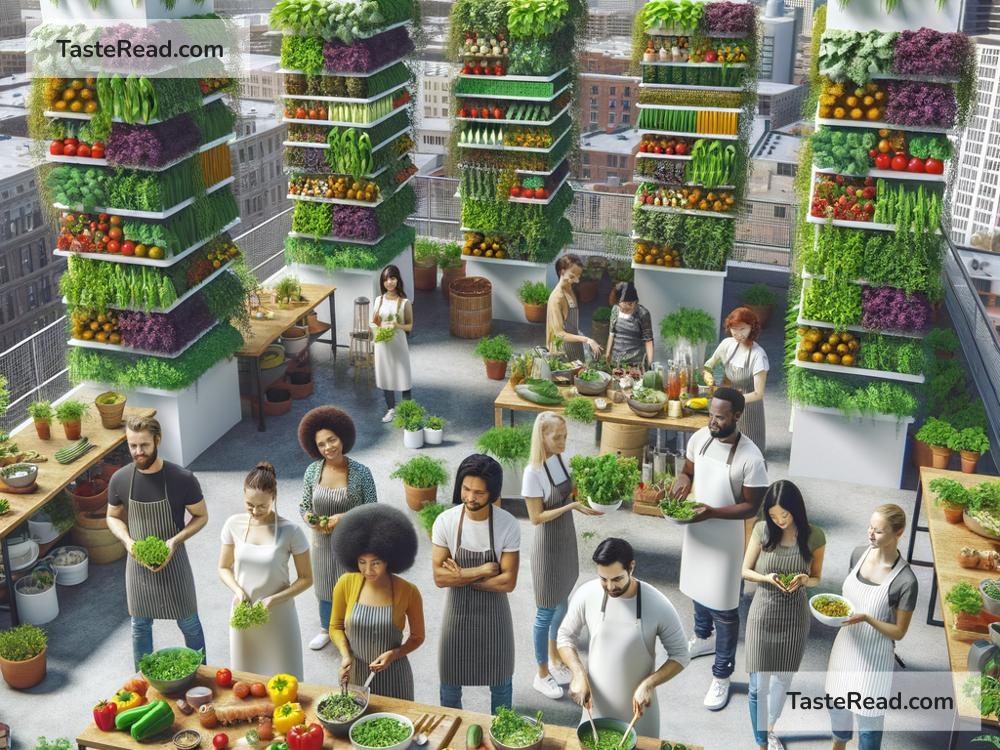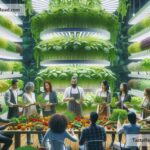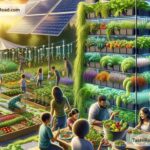The Future of Food and Sustainable Community Development
Today, the way we grow, prepare, and eat food is changing. People around the world are realizing that the future of food is connected to the health of our planet and the well-being of our communities. The choices we make about food affect our environment, our health, and the development of cities and towns. As we look to the future, there are many exciting ideas for making food more sustainable while improving our lives and communities.
Why We Need Change
The way food is produced today is causing harm to the planet. Farms often use chemicals that damage soil, water, and wildlife. Large-scale farming also contributes to climate change by releasing greenhouse gases into the air. At the same time, a lot of food goes to waste. More than one-third of all food is thrown away each year, even though millions of people don’t have enough to eat.
Communities also face challenges because of the current food system. In many areas, access to healthy food is limited, especially for low-income families. Processed foods and sugary snacks are easy to find, but fresh fruits and vegetables are often expensive or unavailable. This leads to health problems such as obesity, diabetes, and heart disease.
To create a better future, we need to rethink the way food is grown, distributed, and consumed. The future of food must focus on protecting the environment, reducing waste, and ensuring that everyone has access to healthy options.
Sustainable Food Production
One of the key ideas for the future of food is sustainable farming. This means growing food in ways that protect the planet and use resources wisely. For example, farmers can use fewer chemicals and rely on natural methods to control pests, such as using insects that eat harmful bugs. Another approach is regenerative agriculture, which focuses on maintaining healthy soil by planting a variety of crops and avoiding overuse of land.
Urban farming is also gaining popularity, especially as cities grow larger. Instead of depending on food from faraway places, cities can produce food locally. Rooftop gardens, vertical farms, and community greenhouses make it possible to grow fresh vegetables and herbs in small spaces. Urban farming reduces transportation costs and helps people connect with food in a new way.
Technology is playing a big role in shaping the future of food production. Farmers are using drones and sensors to monitor crops, detect problems, and improve efficiency. In addition, lab-grown meat is becoming an option for people who want to reduce their consumption of traditional meat. This process involves creating meat from animal cells, and it uses less land, water, and energy than raising animals.
Reducing Food Waste
Another important part of the food revolution is cutting down on waste. When food is thrown away, all the resources used to grow, harvest, and transport it are wasted, too. Communities are coming up with creative ways to prevent food waste. For example, stores and restaurants are donating leftover food to those in need instead of throwing it away. Apps have also been developed to connect people with businesses offering discounted food that is close to its expiration date.
At home, people can make a difference by planning meals, storing food properly, and composting scraps. Composting turns food waste into nutrient-rich soil that can be used in gardens, which helps support sustainable farming efforts.
Access to Healthy Food for All
Building sustainable communities means making sure that everyone can enjoy healthy food, no matter where they live or how much money they earn. Local farmers’ markets and community-supported agriculture (CSA) programs are good examples of ways people can access fresh, local food. These approaches support small-scale farmers and reduce the distance food needs to travel, which also helps the environment.
In some areas, organizations are working to create “food hubs.” These are places where farmers, distributors, and buyers come together to make fresh, affordable food available to the community. Some cities are even turning unused buildings into indoor farms or food centers to serve neighborhoods that lack grocery stores.
Education also plays a key role in improving access to healthy food. Teaching people, especially children, about cooking, nutrition, and gardening helps them make better food choices. School programs that include gardens and cooking classes are helping kids learn where food comes from and how to eat well.
Food as a Community Builder
Food is more than just fuel for our bodies—it’s something that brings people together. Community gardens, shared meals, and local food festivals create opportunities for connection. When people work together to grow and share food, they strengthen their communities and learn more about each other.
By supporting local food businesses, communities can also create jobs and build stronger economies. Small farms, bakeries, cafes, and restaurants are vital parts of sustainable community development. These businesses keep money in the local economy and give people a sense of pride in their neighborhood.
A Better Future is Possible
The future of food is filled with possibilities. By focusing on sustainable farming, reducing waste, improving access to healthy options, and bringing people together, we can create a food system that benefits everyone. Communities around the world are already making changes, and individuals can help by choosing eco-friendly foods, supporting local farmers, and reducing waste.
The way we think about food today will shape the world for future generations. Together, we can build a healthier planet and stronger communities through smarter food choices. The future of food isn’t just about what’s on our plates—it’s about creating a better life for everyone. Let’s make it happen!


